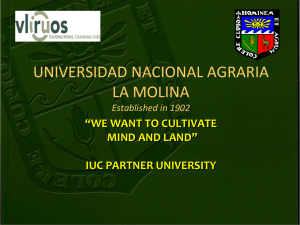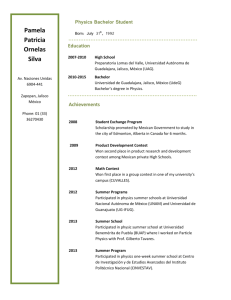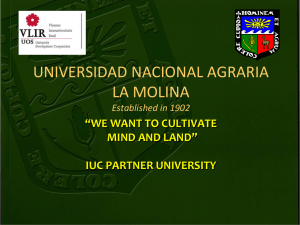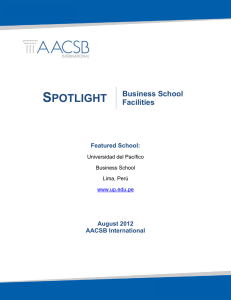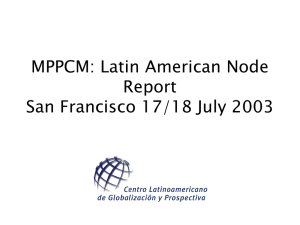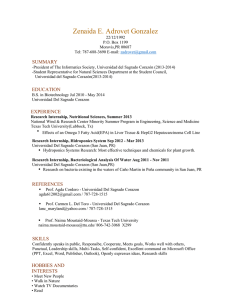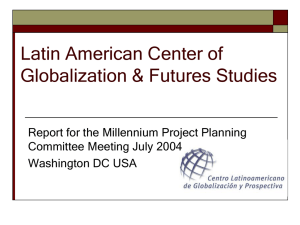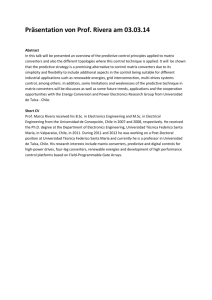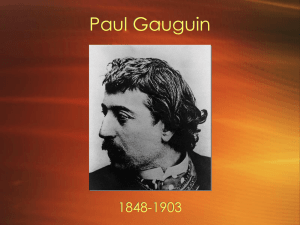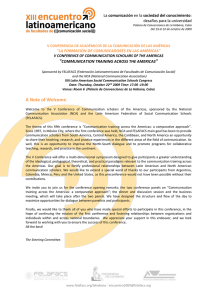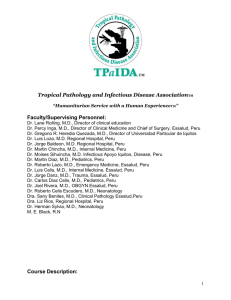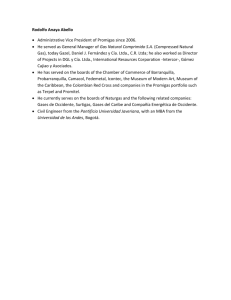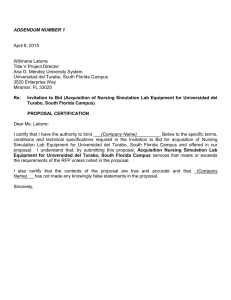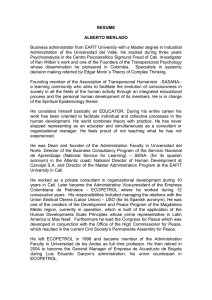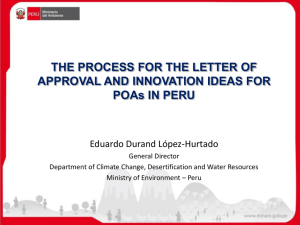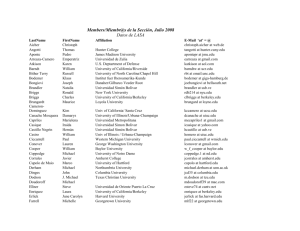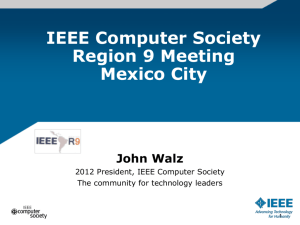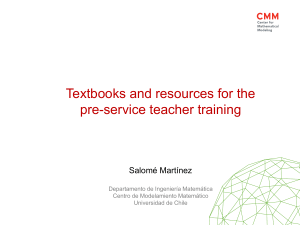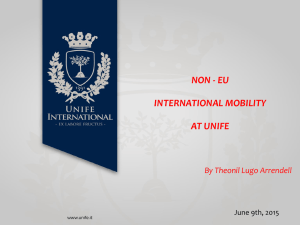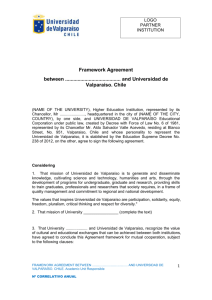Peru - VLIR-UOS
advertisement
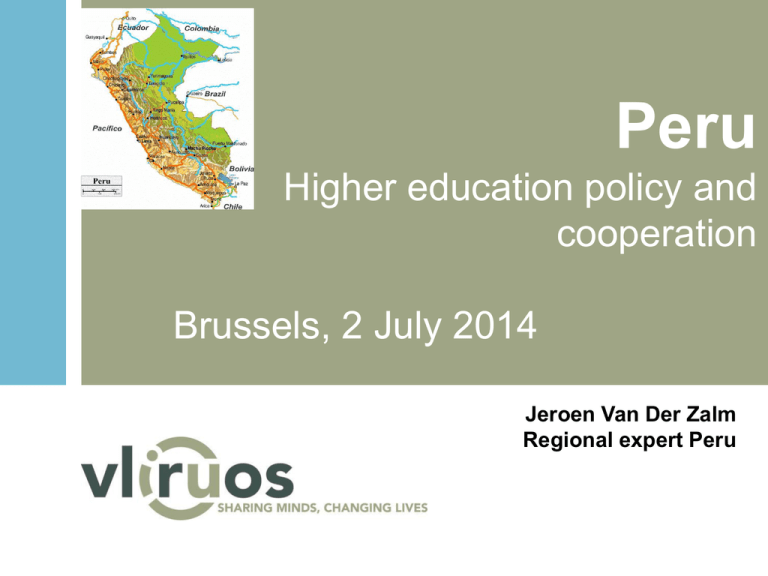
Peru Higher education policy and cooperation Brussels, 2 July 2014 Jeroen Van Der Zalm Regional expert Peru Contents 1. Development context in Peru 2. Higher Education in Peru 3. Initiatives in university cooperation 2 Development context in Peru Population (2012) - Total: 29,549,517 - Aged 15–24: 19.5% Prognosis population by 2020 - Total: 32,435,000 - Aged 15–24: 17.5% Economy (2012) Upper middle income country - GDP: US$ 203.8 billion - GDP 2002-2012: 6,4% (growth 2013: 5%) - GDP per capita (PPP): US $ 6,796 Source: Worldbank Poverty: 48.5% (2004) > 23.9% (2013) Geographical inequalities: rural vs. urban development Main economic activities: Mining, manufacturing, agriculture and fishing Labour force: 25.8% agriculture - 17.4% industry - 56.8% services National priorities Ollanta Humala (2011 – 2016) 1. Equal access to basic services; 2. Employment and social security; 3. Reduction of extreme poverty; 4. Inclusion of rural population. Strategic Development agenda 2011-2021 National Centre for Strategic Planification (CEPLAN): 1. Human rights; 2. Oportunities and acces to services; 3. State and governability; 4. Economy, competition and labour; 5. Regional development and infrastructure; 6. Natural resources and environment. 2. Higher Education in Peru Higher Education Act - 1982: “General Law of Education” - 1983: “University Law” (Ley Universitaria – revised 2013). - 1997: “Law for the promotion of private investments in Education” - 2009: Law Nº 28740: Creation of National Evaluation, Acreditation and Certification System - 2014 (26 June): New University Law Governmental and HE Bodies Ministry of Education – Dirección General de Educación Superior Board of Evaluation, Accreditation and Quality Assurance of University Higher Education (CONEAU) Consejo Nacional de Ciencia, Tecnología e Innovación (CONCYTEC) National Assembly of Rectors (ANR) Consejo Nacional para la Autorización de Funcionamiento de Universidades (CONAFU) Future: National Higher Education Supervision agency (SUNEU) Types of HEI Public University (2011: 50) Private University (2011: 81) Lima: 40% Provinces: 60% Source: ANR Non-university Technical Higher Education Institute Higher Pedagogical Institute Higher Postgraduate Centre QS University Rankings Latin America 2014 30 Pontificia Universidad Catolica del Peru 57 Universidad Nacional Mayor de San Marcos 65 Medical/sciences Universidad Cayetano Heredia 132 Universidad Agraria de La Molina 133 Universidad de Lima 161 Universidad San Martin de Porres Duration Undergraduate: Bachiller: 5-6 years Título profesional: Licenciado: +1 year [thesis] (Especialista: +1 year) Postgraduate: Maestría: 2 years [thesis] Doctorado: 2 years [thesis] Specific interventions PRONABEC - Programa Nacional de Becas y Crédito Educativo Undergraduate scholarships - Beca 18 Postgraduate scholarships - Beca Presidente de la República, Cooperation scholarships – Becas especiales (e.g. Germany, Netherlands, China, Alianza del Pacífico, Spain, South Korea, Japan, France, Russia, Great Britain) Specific interventions FINCyT (Fondo para la Innovación, Ciencia y Tecnología) FOMITEC Framework Fund for Innovation, Science and Technology (US$ 114 million) Fund to promote science and technology links between the private sector, universities and public and private research centres (US$ 100 million) Canon Minero Other donors in university cooperation Spain(Espacio Iberoamericano del Conocimiento) Pablo Neruda Programme: biotechnology; Information technology: sustainability, global change & environment; agroalimentation. Austria (OeAD) Appear programme: Bioremediation of contaminated sites. EU Alfa Puentes: Capacity Building of L.A. University Associations. EU Alfa III (2007-2013): co-operation between Higher Education Institutions of the European Union and Latin America Inter-American Development Bank Innovation for Competitiveness project Belgium (ARES – CCD) Institutional University Cooperation programme with Universidad San Antonio Abad del Cusco (UNSAAC). World Bank & CONEAU Higher Education Quality Improvement Project: strengthening the capacity of universities in accreditation and quality assurance (2012- 2018: 52,17 million USD) Germany (DAAD / DFG): 50 cooperative higher education projects. Negotiations for more structural scientific and technological cooperation.
